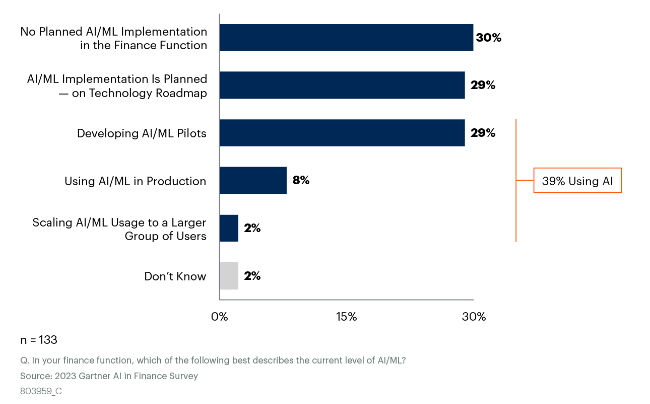In the era of technology explosion, the phrase "AI" (Artificial Intelligence) has become familiar to most people. However, the application of AI in practice, especially in the field of finance and accounting, is still an unfinished story. Let's find out with Bizzi why most finance teams still don't use Ai!
Finance teams still do not apply AI: Opportunity or challenge?
Recently, AI is a popular phrase that everyone knows, but applying AI technology to work is not yet a standard practice for finance and accounting teams.
To be sure, two-thirds of finance leaders surveyed by Gartner said they are using or actively planning to use AI or machine learning in their departments. But so far only 39% has done so, and 30% has no plans to use AI in the finance function.
Gartner believes that CFOs have an important role to play in instilling a culture of acceptance and leveraging of AI capabilities.
“The most successful AI finance organizations embrace and evangelize AI at the C-suite level and embed data science teams into finance functions while avoiding third-party dependencies,” Mark McDonald, said Gartner senior director analyst.
He emphasized that maximizing the benefits of AI requires finance staff to keep an open mind about its potential impact on the workforce. “Only when employees embrace AI as a colleague rather than a threat to their jobs will organizations see the highest possibility and level of success,” McDonald said.
Surveys and actual numbers show a surprising contradiction between the perception and actions of the finance team in applying AI. So what is the reason why financial groups are still hesitant about the AI "fever"?

Why is AI still "slow" in the financial industry?
The financial industry is standing on the threshold of a revolution called Artificial Intelligence (AI). The huge potential that AI brings promises to completely change the way we operate, improve efficiency and open up new opportunities for the industry. However, besides the promises, the application of AI in this field is also facing many challenges and barriers that need to be resolved.
Many reasons lead to the slow application of AI in the financial sector, including:
- Lack of understanding about the benefits of AI: Many finance leaders are still not fully aware of the huge potential that AI can bring to their organizations. They do not yet fully understand how AI can automate tedious tasks, freeing up employees' time to focus on higher value-added work, as well as support informed decision-making based on In-depth data analysis.
- Concerns about impact on employment: The fear that AI will "steal jobs" from people is always present, making many financial employees worry about the risk of losing their jobs. However, it should be viewed objectively that AI will create many new work opportunities, require higher skills and help improve the capacity of existing employees.
- Difficulties in implementing AI: Implementing AI requires significant financial and technical resources. Financial institutions need the infrastructure and qualified expertise to deploy and maintain effective AI systems.
However, the potential that AI brings to the financial sector is enormous, because AI can:
- Automate manual tasks: AI can automate many manual, repetitive tasks, freeing up human resources to focus on jobs that require higher expertise and thinking.
- Improve operational efficiency: Thanks to the ability to analyze data quickly and accurately, AI helps make wise decisions, optimize operational processes, reduce costs and increase profits for businesses.
- Improve customer experience: AI can personalize financial services, providing solutions tailored to each customer's needs and desires, thereby enhancing customer experience and satisfaction.
- Fraud and risk detection: AI has the ability to effectively detect fraud and potential risks, helping to protect assets and reputation for financial institutions.
Although there are still many challenges, the potential of AI in the financial industry is enormous. Financial institutions need to change their thinking and proactively apply AI to improve operational efficiency, bring benefits to customers and promote the overall development of the industry.

Successful strategies when applying AI
Gartner says it has identified some of the characteristics of the most successful financial institutions using AI today. Gartner wrote in its survey report. “Smaller efforts are also easier for employees to understand, making them easier to accept.”
However, transformative results take time. “Only with increased AI capabilities can an organization address complex, company-specific, and transformative use cases such as forecasting, scenario planning, and support for complex decisions. complex,” Gartner wrote. Many cases fail when trying to exceed available AI capabilities.”
Gartner also notes that data science has emerged as a new role in finance, with the majority of finance teams using it. While such headcount was once considered “risky and frivolous,” modern finance teams often employ data scientists whether they leverage AI or not.
Gartner recommends that finance departments pursue a balanced approach in teaching basic data science to existing employees and hire well-trained professional data analysts. “Newly hired professional data scientists provide technical capabilities, while internally trained data officers ensure solutions serve specific financial requirements in accordance with regulatory requirements. existing workflow,” Gartner wrote.
McDonald goes on to advise finance departments to “bring data scientists close to the processes and people who will train AI, making sure those people understand that AI can make their jobs easy.” and give them the time they need to create transformative results.”
Gartner predicts that by 2026, financial institutions with more than three years of investment in AI skills will double their productivity compared to organizations without AI skills. Therefore, financial institutions need to start planning for AI adoption today.
Also by 2026, Gartner says, AI and automation will result in 50% total new hires by top-performing corporate finance functions with backgrounds other than finance or accounting.
To successfully deploy AI, financial institutions need to:
- Raise awareness about the benefits of AI: Finance leaders need to educate their employees about the benefits of AI and how it can be used to improve operational efficiency.
- Develop AI strategy: Financial institutions need to develop a clear strategy for how they will deploy and use AI.
- Invest in infrastructure and expertise: Financial institutions need to invest in the infrastructure and expertise needed to deploy and maintain AI systems.
- Effective change management: Financial institutions need effective change management to ensure that their employees are supported in the transition to AI.
By taking these steps, financial institutions can leverage AI to improve operational efficiency, better manage risk, and enhance customer experience.
Examples of AI applications in the financial industry
- JPMorgan Chase Bank Use AI to detect credit card fraud.
- AIG insurance company Use AI to assess insurance risks.
- Fidelity Investments fund management company Use AI to pick stocks and bonds.
AI is a powerful tool that can help financial institutions improve operational efficiency, better manage risk, and enhance customer experience. While there are still some challenges to address, financial institutions should start planning to adopt AI today to take advantage of the benefits it brings.
Monitor Bizzi To quickly receive the latest information:
- Facebook: https://www.facebook.com/bizzivietnam
- Linkedin: https://www.linkedin.com/company/bizzi-vietnam/
- Youtube: https://www.youtube.com/@bizzivietnam


